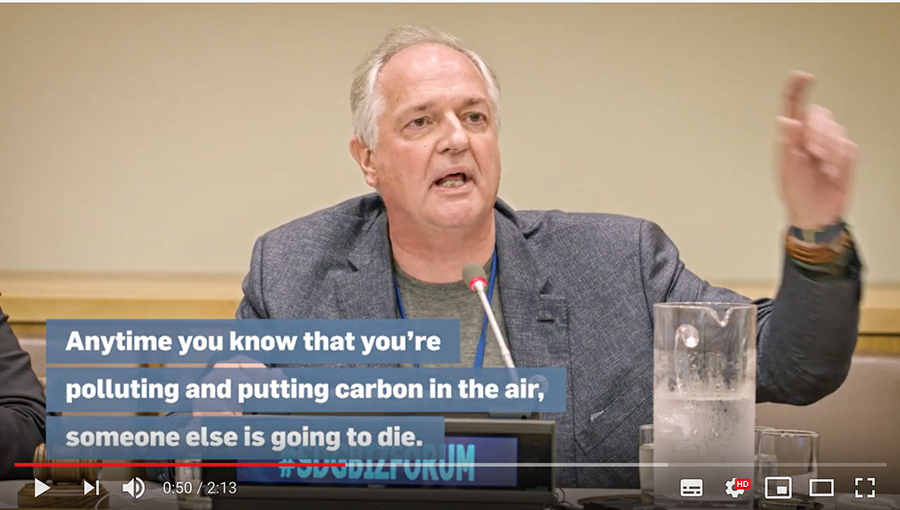When Paul Polman resigned as CEO of British-Dutch consumer goods company Unilever last year, he left behind a decade of innovation and a global company with more than 400 brands, housed in a $140 billion company. He also left behind inspiration for our future, a visionary roadmap for consumers and CEOs alike.
His long-term strategy and courage in the face of early shareholder pressure — combined with a genuinely global worldview — has inspired Unilever’s 170,000 employees to seek authentic purpose in their work. If you’ve ever washed with Dove soap, enjoyed a cup of Lipton tea, eaten a tub of Ben & Jerry’s ice cream, or styled your hair with Toni&Guy, you can be confident that Polman’s foresight was behind it. It’s tough being a visionary — especially when your ideas are so far ahead that no one recognizes what you’re building.
“It’s the best of times, it’s the worst of times,” says Polman, quoting Charles Dickens. “When Dickens wrote The Tale of Two Cities, ‘it was the spring of hope and the winter of despair,’ and I think this is where we find ourselves today.”
On one side, people are living longer and healthier lives, more have access to formal education, and more individuals than ever before have been lifted from poverty. And while some leaders scoffed at the United Nations Millennium Development Goals set in 2000 under Kofi Annan, which had a goal of cutting global poverty in half, miraculously, this was achieved by the target date of 2015.
And yet, while progress is being made, it’s not all roses, says Polman, who thinks the system is still flawed and these victories may be short-lived. “We’ve seen enormous levels of over-consumption and private and government debt across world markets,” he says. “Frankly, we’re leaving too many people behind. When you do this, the system starts to rebel against itself.” He cites the yellow vest protests on the streets of France as a manifestation of what many people are feeling across the world right now.
There’s something appealing about a business leader who adopts the attitude of a world leader, someone who has the wisdom to see the interconnectivity between a bottle of shampoo and rioting on the street (waterless hair products ultimately result in less stress on an economic system). Under Polman, Unilever is one such company, recognizing early on that the challenges of running a business in a chaotic world are precisely where the economic growth is found.
Polman will be staying on at Unilever until early July to support the handover to his successor Alan Jope. With the spotlight now off Polman as one of the world’s most powerful CEOs, he’s adamant there is still much to do. “I have no intention of retiring, nor would I recommend it,” he explains. “I will certainly keep working to help solve pressing world challenges. Indeed, now that I am no longer running a company, I can dedicate even more time to this agenda. We cannot stop until we truly leave no one behind.” For example, he serves as chair of the International Chamber of Commerce (ICC), chair of the B Team, and vice chair of the United Nations Global Compact.
“CEOs are increasingly focused on the next quarter, driven by the pressures of the financial markets,” he continues. “Or in the case of governments, the next election cycle. This is an opportunity for all of us in the private sector to step up.”
With more than 45 million companies associated with the ICC, Polman made a smart move by recognizing the tremendous opportunity for Unilever to become a thought leader among the world’s corporations, while helping to develop a new social contract that would focus on climate change and inequality. Luckily, when he arrived at Unilever, he already found a company with the right value system in place and a desire to be a force for good.
He recalls that most of our current global governance dates back to Bretton Woods in 1944. The issues we face today are vastly different from 74 years ago, when 90 percent of the world was found in Western Europe and the United States. Topics such as climate change, cybersecurity, and financial market regulations are now global issues, but without the modern mechanisms to deal with them.
“Let’s face it, it’s not easy being a CEO today. The average life of a publicly traded company in the U.S. has dropped from 67 years to 17 during my lifetime,” says the 62-year-old Polman. “The average tenure of a CEO has dropped to just four and a half years. It’s the result of companies not knowing how to deal with the new world order they see around them. However, business is here to serve society, and if businesses can’t explain what benefits they bring, then why should society keep us around?”
At first, skeptical analysts were doubtful about Polman’s outlook — that business was first and foremost about developing solutions for the world’s citizens. Unilever’s stock fell by 27 percent in 2008 when he stepped into the role of CEO, partly due to the financial crisis; but he was vindicated by the time he left — delivering a 290 percent total shareholder return and 19 percent return on invested capital over the last ten years. Polman points out that consumers today have deep insight into the products they purchase and will reward companies that behave responsibly. Increasingly, they will punish companies that don’t. “The SDG agenda is actually one of the best and most attractive business plans around,” says Polman.
A passionate supporter of the Sustainable Development Goals (SDGs), Polman helped create The Commission of Business and Sustainable Development, which launched at the 2016 World Economic Forum in Davos. Its first report, that same year, convincingly illustrated the benefits to business of pursuing the Global Goals. It found that sustainable business models could open up at least $12 trillion of economic opportunities and create up to 380 million jobs by 2030 globally.
Balance this against the fact that the cost of not acting is becoming higher than the price of acting. For example, according to Polman, climate change is costing the planet more than $5.3 trillion a year and rising at a staggering rate. “This is probably the biggest intergenerational crime we’ve ever committed,” he says. “The visible results are the drowning of little island-states and 8 million people per year being sent to a premature death from air pollution. Consider that creating action around the SDGs will cost less than $5.3 trillion.”
“The world is also spending 10 to 12 percent of its global GDP (roughly $12 trillion) on conflict prevention and war,” says Polman. “Governments are willing to spend up to three times more on dealing with the consequences of our war-like nature, rather than looking at what it might cost to avoid these conflicts in the first place.” What gives Polman hope is that while governments act according to ideology, financial markets understand the risks related to climate change and will probably act accordingly. There’s nothing like the threat of lost income to inspire action.
Unilever’s goal of reaching 1 billion people and improving their health and well-being is underway, with much of the success attributed to a baked-in sense of purpose within its brands. “The better these brands are connected to real needs or issues in society, the better they perform,” Polman points out. An example is Dove, which has a goal of reaching 60 million adolescent girls and addressing women’s self-esteem. LifeBuoy wants to reach 1 billion people and teach them the importance of handwashing to prevent 4 million child deaths from infectious diseases. Domestos has a goal to build 25 million toilets globally.
“There is no business strategy in runaway climate change, growing inequality, and extreme poverty,” says Polman. “We’ve already shown that we can address basic issues, yet collectively, we’re not doing it. At the end of the day, it boils down to willpower. It boils down to leadership.”
Part of his leadership team is his wife Kim, who runs a foundation called Reboot the Future. Dedicated to nurturing a new breed of leader, she is helping people put purpose and responsibility at the heart of their actions. In the coaching of leaders and the raising of their three sons, she abides by her Golden Rule: “Treat others and the planet as you would wish to be treated.” The couple have become guiding lights on how a compassionate approach to business, politics, and the environment can transform our planet.
“We’re short of leaders and trees in the world right now,” says Polman with a laugh. “We need to create more heroic leaders, ones who are more purpose-driven with a high level of awareness of what’s going on in the world and an ability to engage. We need leaders who understand the true meaning of what a partnership is, and put others’ interests ahead of their own. In doing so, they will become financially better-off, too. All the changes we’ve ever seen in society have come about through the initiatives of courageous individuals.”
Opportunity naturally gravitates toward those who have the courage to act, and Polman’s parting words were reserved for the audience of Real Leaders, where he stressed a duty to future generations. “I want to remind many of you that you belong to 2 percent of the world population when it comes to income, education and lifestyle. Therefore, it’s your duty to put yourself in the service of the other 98 percent.”




































